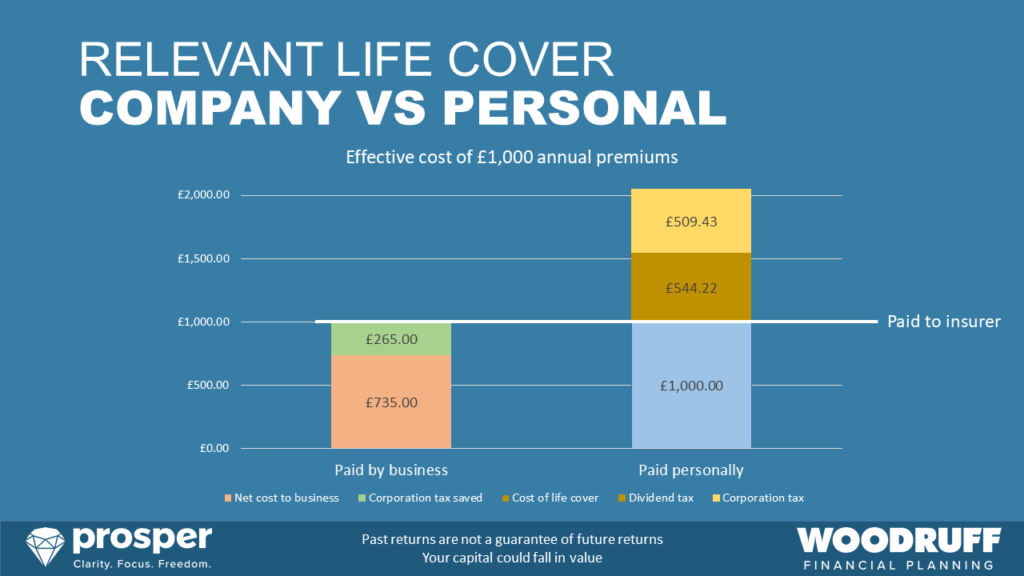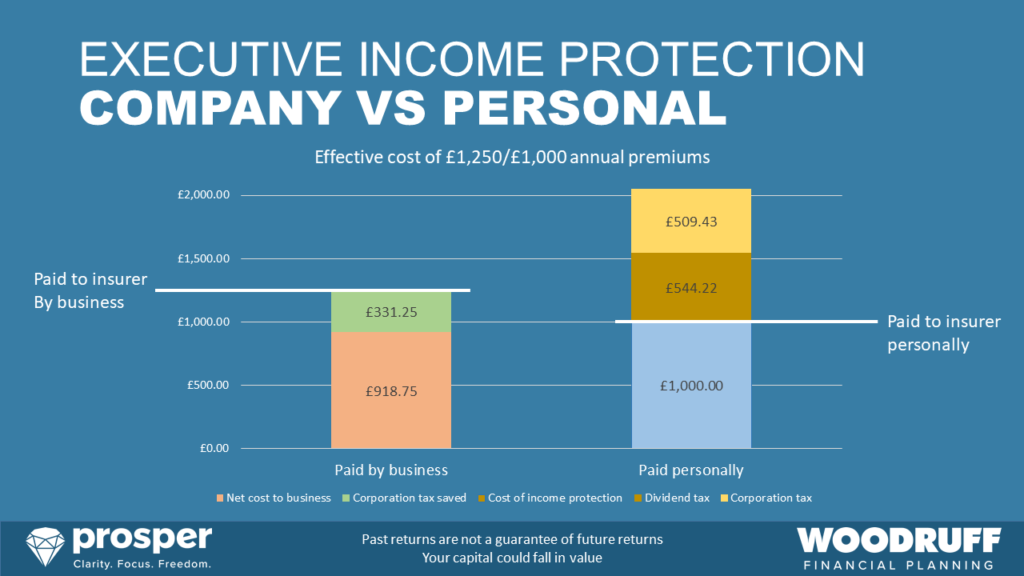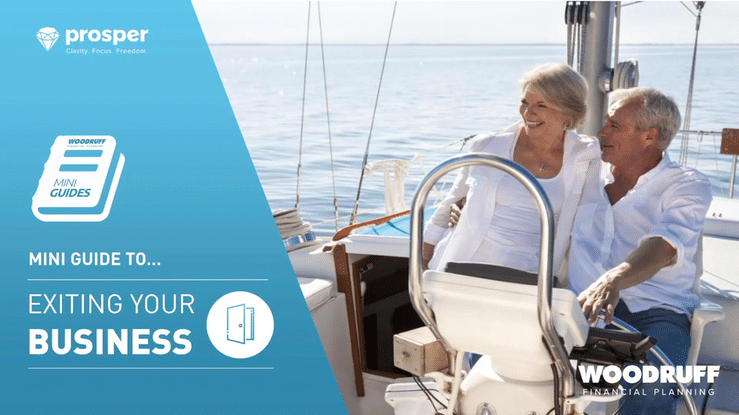Business Owner Protection
Tax-efficient insurance for business owners against death and illnessThis article explores business owner protection. This is life insurance as well as income protection cover for business owners. We explain what a business owner needs to know before taking out life insurance or income protection. As a business owner you are in an unique position where you can purchase insurance protection through your business – this will save you tax and money. Depending on the situation, business protection could save tax between 55% to 64%.
Key topics on business owner protection
| 1. Business owner life cover – relevant life insurance | 3. Shareholder protection |
| 2. Business owner executive income protection | 4. Financial planning for business owners |
The main types of business owner protection
This article is aimed at business owners rather than the general public. Business owners have particular needs and tax status when it comes to protecting their family lifestyle. In addition, this article focusses on the needs of the business owner, rather than their company. This is an important distinction as business owner protection looks to cover the individual rather than the company. Other forms of insurance exist to protect the business, which are not explored in this article.
Why do you need business owner protection?
We advise business owners, rather than their companies. This is an important distinction, since we help the owner-directors in the business, rather than the business itself. Companies can take out insurance on their key staff (known as key person cover). Key person cover aims to protect the business rather than the individual, as the proceeds of any claim would benefit the business to help it continue to trade. This article examines the cover that a business can take out for the benefit of its employees (the business owner).
1. Business owner life cover – known as relevant life insurance
Relevant life insurance is a type of life cover that pays a lump sum after an employee dies. The relevant life plan pays a lump sum to the employee’s family after their death. This type of policy is designed to insure a business owner’s family against the risk of the early death of that person. Relevant life cover can be taken out on behalf of any employee, although this article is concerned with the business owner.
This is much like any other life cover plan (term assurance). The major difference with a relevant life plan is that a business owner can take out life cover for their own family, but have the business pay for the insurance.
Tax benefits of relevant life cover
If the business pays for the life cover, this is particularly tax-efficient for business owners. The tax saving could be as high as 64%.
Obviously there is a practical benefit because the cost of the cover is paid by the business. This cost qualifies as a business expense. Therefore, the life cover premiums are allowable to reduce the profits of the business, saving corporation tax at up to 26.5%. In practical terms, if a relevant life cover plan costs £1,000 per year, up to £265 would be saved against corporation tax by the business. The net cost is £735 per year.
Personal cover is much less tax-efficient
As an alternative, the business owner might take out a similar term assurance plan personally (not through the business). If the same personal term assurance plan costs £1,000 per year, the business must pay corporation tax on the amount withdrawn as income by the business owner to pay the cost of the cover. If we assume corporation tax of 26.5% and dividend tax of 33.75%, the total cost increases dramatically to £2,053.65.
If a business generates profit of £2,053.65, this attracts corporation tax of up to 26.5% – £544.22. The remaining profit of £1,509.43 could be distributed as a dividend to the business owner. If tax is 33.75% the cost is £509.43. The business owner receives £1,000 after tax and pays for the personal term assurance.
Summary of business owner life cover vs personal life cover
If the business owner had instead used relevant life cover then the tax saving for the same cover would have been £1,318.65. The total tax saving is an incredible 64%!

The relevant life policy does not affect the individual business owner’s personal tax – it is not a benefit in kind. In addition, it does not affect pension allowances like a death in service scheme.
If you write the relevant life policy in trust, the deceased’s family can receive the lump sum free of inheritance tax.
Essentially, a business owner can take out life insurance for their own benefit, but have their business pay for it in a tax-efficient way, effectively saving tax at 64%.
2. Business owner income protection – known as executive income protection
Income protection cover pays the insured an income when they are unable to do their normal work. The policy will pay out after an initial period for as long as that person is too ill to work in their normal role. The payments continue until the policy comes to an end, or the insured person is fit enough to return to work. The tax saving could be as high as 55%.
This puts income in the hands of the insured when they most need it. Executive income protection is useful for business owners since it seeks to provide a kind of sickness benefit.
Tax benefits of executive income protection cover
The business can pay for the insurance, and the premiums are deductible as a business expense. This in turn reduces the corporation tax of the business by up to 26.5%. In practical terms, if an executive income protection plan costs £1,000 per year, up to £265 would be saved against corporation tax by the business. The net cost is £735 per year.
The cover does not count against the personal tax of the business owner, and is not a benefit in kind. However, when the policy is claimed the benefit will be taxable as if it were a salary. This is because the benefit is paid to the business, not the business owner. Think of the cover as replacement income, taxed as if it were a salary. The business will receive any benefits and then pay those to the business owner – just like a salary. As the benefits are taxable, allowance must be made for the income tax if a claim is necessary.
This means that whatever income the business owner wants to receive must allow for income tax. This is complicated by the amount of income required and the overall tax position. In our example, we have taken 20% income tax as a baseline. In practice, this will vary according to the individual position.
Therefore, if we assume that income tax is payable on benefits at 20%, the cover and cost would be inflated by 25% compared to a personal income protection plan. To use the example above, for an executive income protection plan to match a personal plan costing £1,000 per year, the executive plan would need to increase to a cost of £1,250. Therefore, up to £331.25 would be saved against corporation tax by the business. The net cost is £918.75 per year.
Personal cover is much less tax-efficient
Other types of income protection cover pay benefits free of income tax. However, for a business owner this is less tax-efficient since the cost of the cover must be paid by the individual. This means paying corporation tax on the profits, and then income tax on the extraction of income from the business to pay for the cover. Executive income protection is more tax-efficient since it allows the business to pay, saving tax on the cost of cover.
Essentially, a business owner can set up a kind of sickness benefit where their business pays for the cover in a tax-efficient way. The only downside is that the benefits would be taxable as income. This means that to provide the same level of cover in the hands of the business owner, executive income protection cover needs to be inflated to allow for the income tax. This is not necessary for personal cover paid by the business owner.
If a business generates profit of £2,053.65, this attracts corporation tax of up to 26.5% – £544.22. The remaining profit of £1,509.43 could be distributed as a dividend to the business owner. If tax is 33.75% the cost is £509.43. The business owner receives £1,000 after tax and pays for the personal income protection.
Summary of business executive income protection cover vs personal income protection cover
If the business owner had instead used executive income protection cover then the tax saving for the same cover would have been £1,134.90. The total tax saving is an incredible 55%!

The executive income protection policy does not affect the individual business owner’s personal tax – it is not a benefit in kind. The downside is that any claim would attract income tax on payments to the business owner, which is why the benefits have to be inflated to allow for this tax.
Essentially, a business owner can take out income protection for their own benefit, but have their business pay for it in a tax-efficient way, effectively saving tax at 55%.
3. Shareholder protection cover
Shareholder protection cover aims to protect the family who is left behind when the business owner who is a shareholder dies.
Imagine a business with 2 friends, who both work in the company and are both shareholders equally. If one dies, they may leave their own shares in their will to their surviving spouse. At that stage, the surviving business owner is now in a business relationship with the surviving spouse. The surviving spouse may not have the skills or desire to run the business after their partner’s death. A shareholder protection policy allows the surviving business owner to buy the shares of the surviving spouse using the policy proceeds. This is usually combined with option agreements and trusts to give both sides flexibility in the event of a claim. These agreements can allow either side to enforce the purchase and sale of the shares using the shareholder protection policy proceeds.
Shareholder protection is not as tax-efficient as relevant life cover. A business can take out this type of insurance for the shareholders. This would qualify as a business expense and therefore would help reduce corporation tax at 26.5%. However, the policy cost would be treated as a benefit in kind for the business owner shareholders. This means that the cost of cover would attract income tax as if it were a salary.
Essentially, a business owner can have their business pay for cover to pay their family for the value of their shares after they die. Any surviving business owners get to control the business after the death of a shareholder. The surviving spouse gets paid for the value of the shares without having to remain involved in the business. The only downside is that that cost of the cover would be taxed as a benefit in kind for the business owner while they are alive.
Financial planning for business owners
Our Prosper service considers the effect of serious illness or death for business owner clients. We examine the effects of these scenarios on the business owner’s finances, as well as their family should the worst happen.
Business owners are in a good position to set up insurance cover to protect your family against illness and death. You can also benefit from the tax treatment of these types of insurance, while the business pays for the cover.
If you are a business owner, who needs cover for you family, contact us now to discuss the amazing tax benefits mentioned above.
Other tax-saving tips for business owners
Get your free mini guide on
Financial Planning for Business Owners
Business owners: This FREE Mini Guide is perfect for you if you are a Business Owner who wants to understand the financial planning issues you should consider and also how to appoint the right financial planner.

Get your free mini guide for business owners
Fill out the form below
Got a Question? Call 01206 919101
SELLING YOUR BUSINESS?
Find out how we help you Prosper from your business sale.

About Dan Woodruff
Certified Financial Planner & Chartered Wealth Manager at Woodruff Financial Planning
Financial Planning helps you to navigate and anticipate significant life changes. I want to help you to ensure your money is managed wisely to give you the financial security that will fund the future and lifestyle that is important to you.
